#freedom of reach
Text
Pluralistic: Leaving Twitter had no effect on NPR's traffic

I'm coming to Minneapolis! This Sunday (Oct 15): Presenting The Internet Con at Moon Palace Books. Monday (Oct 16): Keynoting the 26th ACM Conference On Computer-Supported Cooperative Work and Social Computing.

Enshittification is the process by which a platform lures in and then captures end users (stage one), who serve as bait for business customers, who are also captured (stage two), whereupon the platform rug-pulls both groups and allocates all the value they generate and exchange to itself (stage three):
https://pluralistic.net/2023/01/21/potemkin-ai/#hey-guys
Enshittification isn't merely a form of rent-seeking – it is a uniquely digital phenomenon, because it relies on the inherent flexibility of digital systems. There are lots of intermediaries that want to extract surpluses from customers and suppliers – everyone from grocers to oil companies – but these can't be reconfigured in an eyeblink the that that purely digital services can.
A sleazy boss can hide their wage-theft with a bunch of confusing deductions to your paycheck. But when your boss is an app, it can engage in algorithmic wage discrimination, where your pay declines minutely every time you accept a job, but if you start to decline jobs, the app can raise the offer:
https://pluralistic.net/2023/04/12/algorithmic-wage-discrimination/#fishers-of-men
I call this process "twiddling": tech platforms are equipped with a million knobs on their back-ends, and platform operators can endlessly twiddle those knobs, altering the business logic from moment to moment, turning the system into an endlessly shifting quagmire where neither users nor business customers can ever be sure whether they're getting a fair deal:
https://pluralistic.net/2023/02/19/twiddler/
Social media platforms are compulsive twiddlers. They use endless variation to lure in – and then lock in – publishers, with the goal of converting these standalone businesses into commodity suppliers who are dependent on the platform, who can then be charged rent to reach the users who asked to hear from them.
Facebook designed this playbook. First, it lured in end-users by promising them a good deal: "Unlike Myspace, which spies on you from asshole to appetite, Facebook is a privacy-respecting site that will never, ever spy on you. Simply sign up, tell us everyone who matters to you, and we'll populate a feed with everything they post for public consumption":
https://lawcat.berkeley.edu/record/1128876
The users came, and locked themselves in: when people gather in social spaces, they inadvertently take one another hostage. You joined Facebook because you liked the people who were there, then others joined because they liked you. Facebook can now make life worse for all of you without losing your business. You might hate Facebook, but you like each other, and the collective action problem of deciding when and whether to go, and where you should go next, is so difficult to overcome, that you all stay in a place that's getting progressively worse.
Once its users were locked in, Facebook turned to advertisers and said, "Remember when we told these rubes we'd never spy on them? It was a lie. We spy on them with every hour that God sends, and we'll sell you access to that data in the form of dirt-cheap targeted ads."
Then Facebook went to the publishers and said, "Remember when we told these suckers that we'd only show them the things they asked to see? Total lie. Post short excerpts from your content and links back to your websites and we'll nonconsensually cram them into the eyeballs of people who never asked to see them. It's a free, high-value traffic funnel for your own site, bringing monetizable users right to your door."
Now, Facebook had to find a way to lock in those publishers. To do this, it had to twiddle. By tiny increments, Facebook deprioritized publishers' content, forcing them to make their excerpts grew progressively longer. As with gig workers, the digital flexibility of Facebook gave it lots of leeway here. Some publishers sensed the excerpts they were being asked to post were a substitute for visiting their sites – and not an enticement – and drew down their posting to Facebook.
When that happened, Facebook could twiddle in the publisher's favor, giving them broader distribution for shorter excerpts, then, once the publisher returned to the platform, Facebook drew down their traffic unless they started posting longer pieces. Twiddling lets platforms play users and business-customers like a fish on a line, giving them slack when they fight, then reeling them in when they tire.
Once Facebook converted a publisher to a commodity supplier to the platform, it reeled the publishers in. First, it deprioritized publishers' posts when they had links back to the publisher's site (under the pretext of policing "clickbait" and "malicious links"). Then, it stopped showing publishers' content to their own subscribers, extorting them to pay to "boost" their posts in order to reach people who had explicitly asked to hear from them.
For users, this meant that their feeds were increasingly populated with payola-boosted content from advertisers and pay-to-play publishers who paid Facebook's Danegeld to reach them. A user will only spend so much time on Facebook, and every post that Facebook feeds that user from someone they want to hear from is a missed opportunity to show them a post from someone who'll pay to reach them.
Here, too, twiddling lets Facebook fine-tune its approach. If a user starts to wean themself off Facebook, the algorithm (TM) can put more content the user has asked to see in the feed. When the user's participation returns to higher levels, Facebook can draw down the share of desirable content again, replacing it with monetizable content. This is done minutely, behind the scenes, automatically, and quickly. In any shell game, the quickness of the hand deceives the eye.
This is the final stage of enshittification: withdrawing surpluses from end-users and business customers, leaving behind the minimum homeopathic quantum of value for each needed to keep them locked to the platform, generating value that can be extracted and diverted to platform shareholders.
But this is a brittle equilibrium to maintain. The difference between "God, I hate this place but I just can't leave it" and "Holy shit, this sucks, I'm outta here" is razor-thin. All it takes is one privacy scandal, one livestreamed mass-shooting, one whistleblower dump, and people bolt for the exits. This kicks off a death-spiral: as users and business customers leave, the platform's shareholders demand that they squeeze the remaining population harder to make up for the loss.
One reason this gambit worked so well is that it was a long con. Platform operators and their investors have been willing to throw away billions convincing end-users and business customers to lock themselves in until it was time for the pig-butchering to begin. They financed expensive forays into additional features and complementary products meant to increase user lock-in, raising the switching costs for users who were tempted to leave.
For example, Facebook's product manager for its "photos" product wrote to Mark Zuckerberg to lay out a strategy of enticing users into uploading valuable family photos to the platform in order to "make switching costs very high for users," who would have to throw away their precious memories as the price for leaving Facebook:
https://www.eff.org/deeplinks/2021/08/facebooks-secret-war-switching-costs
The platforms' patience paid off. Their slow ratchets operated so subtly that we barely noticed the squeeze, and when we did, they relaxed the pressure until we were lulled back into complacency. Long cons require a lot of prefrontal cortex, the executive function to exercise patience and restraint.
Which brings me to Elon Musk, a man who seems to have been born without a prefrontal cortex, who has repeatedly and publicly demonstrated that he lacks any restraint, patience or planning. Elon Musk's prefrontal cortical deficit resulted in his being forced to buy Twitter, and his every action since has betrayed an even graver inability to stop tripping over his own dick.
Where Zuckerberg played enshittification as a long game, Musk is bent on speedrunning it. He doesn't slice his users up with a subtle scalpel, he hacks away at them with a hatchet.
Musk inaugurated his reign by nonconsensually flipping every user to an algorithmic feed which was crammed with ads and posts from "verified" users whose blue ticks verified solely that they had $8 ($11 for iOS users). Where Facebook deployed substantial effort to enticing users who tired of eyeball-cramming feed decay by temporarily improving their feeds, Musk's Twitter actually overrode users' choice to switch back to a chronological feed by repeatedly flipping them back to more monetizable, algorithmic feeds.
Then came the squeeze on publishers. Musk's Twitter rolled out a bewildering array of "verification" ticks, each priced higher than the last, and publishers who refused to pay found their subscribers taken hostage, with Twitter downranking or shadowbanning their content unless they paid.
(Musk also squeezed advertisers, keeping the same high prices but reducing the quality of the offer by killing programs that kept advertisers' content from being published along Holocaust denial and open calls for genocide.)
Today, Musk continues to squeeze advertisers, publishers and users, and his hamfisted enticements to make up for these depredations are spectacularly bad, and even illegal, like offering advertisers a new kind of ad that isn't associated with any Twitter account, can't be blocked, and is not labeled as an ad:
https://www.wired.com/story/xs-sneaky-new-ads-might-be-illegal/
Of course, Musk has a compulsive bullshitter's contempt for the press, so he has far fewer enticements for them to stay. Quite the reverse: first, Musk removed headlines from link previews, rendering posts by publishers that went to their own sites into stock-art enigmas that generated no traffic:
https://www.theguardian.com/technology/2023/oct/05/x-twitter-strips-headlines-new-links-why-elon-musk
Then he jumped straight to the end-stage of enshittification by announcing that he would shadowban any newsmedia posts with links to sites other than Twitter, "because there is less time spent if people click away." Publishers were advised to "post content in long form on this platform":
https://mamot.fr/@pluralistic/111183068362793821
Where a canny enshittifier would have gestured at a gaslighting explanation ("we're shadowbanning posts with links because they might be malicious"), Musk busts out the motto of the Darth Vader MBA: "I am altering the deal, pray I don't alter it any further."
All this has the effect of highlighting just how little residual value there is on the platform for publishers, and tempts them to bolt for the exits. Six months ago, NPR lost all patience with Musk's shenanigans, and quit the service. Half a year later, they've revealed how low the switching cost for a major news outlet that leaves Twitter really are: NPR's traffic, post-Twitter, has declined by less than a single percentage point:
https://niemanreports.org/articles/npr-twitter-musk/
NPR's Twitter accounts had 8.7 million followers, but even six months ago, Musk's enshittification speedrun had drawn down NPR's ability to reach those users to a negligible level. The 8.7 million number was an illusion, a shell game Musk played on publishers like NPR in a bid to get them to buy a five-figure iridium checkmark or even a six-figure titanium one.
On Twitter, the true number of followers you have is effectively zero – not because Twitter users haven't explicitly instructed the service to show them your posts, but because every post in their feeds that they want to see is a post that no one can be charged to show them.
I've experienced this myself. Three and a half years ago, I left Boing Boing and started pluralistic.net, my cross-platform, open access, surveillance-free, daily newsletter and blog:
https://pluralistic.net/2023/02/19/drei-drei-drei/#now-we-are-three
Boing Boing had the good fortune to have attracted a sizable audience before the advent of siloed platforms, and a large portion of that audience came to the site directly, rather than following us on social media. I knew that, starting a new platform from scratch, I wouldn't have that luxury. My audience would come from social media, and it would be up to me to convert readers into people who followed me on platforms I controlled – where neither they nor I could be held to ransom.
I embraced a strategy called POSSE: Post Own Site, Syndicate Everywhere. With POSSE, the permalink and native habitat for your material is a site you control (in my case, a WordPress blog with all the telemetry, logging and surveillance disabled). Then you repost that content to other platforms – mostly social media – with links back to your own site:
https://indieweb.org/POSSE
There are a lot of automated tools to help you with this, but the platforms have gone to great lengths to break or neuter them. Musk's attack on Twitter's legendarily flexible and powerful API killed every automation tool that might help with this. I was lucky enough to have a reader – Loren Kohnfelder – who coded me some python scripts that automate much of the process, but POSSE remains a very labor-intensive and error-prone methodology:
https://pluralistic.net/2021/01/13/two-decades/#hfbd
And of all the feeds I produce – email, RSS, Discourse, Medium, Tumblr, Mastodon – none is as labor-intensive as Twitter's. It is an unforgiving medium to begin with, and Musk's drawdown of engineering support has made it wildly unreliable. Many's the time I've set up 20+ posts in a thread, only to have the browser tab reload itself and wipe out all my work.
But I stuck with Twitter, because I have a half-million followers, and to the extent that I reach them there, I can hope that they will follow the permalinks to Pluralistic proper and switch over to RSS, or email, or a daily visit to the blog.
But with each day, the case for using Twitter grows weaker. I get ten times as many replies and reposts on Mastodon, though my Mastodon follower count is a tenth the size of my (increasingly hypothetical) Twitter audience.
All this raises the question of what can or should be done about Twitter. One possible regulatory response would be to impose an "End-To-End" rule on the service, requiring that Twitter deliver posts from willing senders to willing receivers without interfering in them. End-To-end is the bedrock of the internet (one of its incarnations is Net Neutrality) and it's a proven counterenshittificatory force:
https://www.eff.org/deeplinks/2023/06/save-news-we-need-end-end-web
Despite what you may have heard, "freedom of reach" is freedom of speech: when a platform interposes itself between willing speakers and their willing audiences, it arrogates to itself the power to control what we're allowed to say and who is allowed to hear us:
https://pluralistic.net/2022/12/10/e2e/#the-censors-pen
We have a wide variety of tools to make a rule like this stick. For one thing, Musk's Twitter has violated innumerable laws and consent decrees in the US, Canada and the EU, which creates a space for regulators to impose "conduct remedies" on the company.
But there's also existing regulatory authorities, like the FTC's Section Five powers, which enable the agency to act against companies that engage in "unfair and deceptive" acts. When Twitter asks you who you want to hear from, then refuses to deliver their posts to you unless they pay a bribe, that's both "unfair and deceptive":
https://pluralistic.net/2023/01/10/the-courage-to-govern/#whos-in-charge
But that's only a stopgap. The problem with Twitter isn't that this important service is run by the wrong mercurial, mediocre billionaire: it's that hundreds of millions of people are at the mercy of any foolish corporate leader. While there's a short-term case for improving the platforms, our long-term strategy should be evacuating them:
https://pluralistic.net/2023/07/18/urban-wildlife-interface/#combustible-walled-gardens
To make that a reality, we could also impose a "Right To Exit" on the platforms. This would be an interoperability rule that would require Twitter to adopt Mastodon's approach to server-hopping: click a link to export the list of everyone who follows you on one server, click another link to upload that file to another server, and all your followers and followees are relocated to your new digs:
https://pluralistic.net/2022/12/23/semipermeable-membranes/#free-as-in-puppies
A Twitter with the Right To Exit would exert a powerful discipline even on the stunted self-regulatory centers of Elon Musk's brain. If he banned a reporter for publishing truthful coverage that cast him in a bad light, that reporter would have the legal right to move to another platform, and continue to reach the people who follow them on Twitter. Publishers aghast at having the headlines removed from their Twitter posts could go somewhere less slipshod and still reach the people who want to hear from them on Twitter.
And both Right To Exit and End-To-End satisfy the two prime tests for sound internet regulation: first, they are easy to administer. If you want to know whether Musk is permitting harassment on his platform, you have to agree on a definition of harassment, determine whether a given act meets that definition, and then investigate whether Twitter took reasonable steps to prevent it.
By contrast, administering End-To-End merely requires that you post something and see if your followers receive it. Administering Right To Exit is as simple as saying, "OK, Twitter, I know you say you gave Cory his follower and followee file, but he says he never got it. Just send him another copy, and this time, CC the regulator so we can verify that it arrived."
Beyond administration, there's the cost of compliance. Requiring Twitter to police its users' conduct also requires it to hire an army of moderators – something that Elon Musk might be able to afford, but community-supported, small federated servers couldn't. A tech regulation can easily become a barrier to entry, blocking better competitors who might replace the company whose conduct spurred the regulation in the first place.
End-to-End does not present this kind of barrier. The default state for a social media platform is to deliver posts from accounts to their followers. Interfering with End-To-End costs more than delivering the messages users want to have. Likewise, a Right To Exit is a solved problem, built into the open Mastodon protocol, itself built atop the open ActivityPub standard.
It's not just Twitter. Every platform is consuming itself in an orgy of enshittification. This is the Great Enshittening, a moment of universal, end-stage platform decay. As the platforms burn, calls to address the fires grow louder and harder for policymakers to resist. But not all solutions to platform decay are created equal. Some solutions will perversely enshrine the dominance of platforms, help make them both too big to fail and too big to jail.
Musk has flagrantly violated so many rules, laws and consent decrees that he has accidentally turned Twitter into the perfect starting point for a program of platform reform and platform evacuation.

If you'd like an essay-formatted version of this post to read or share, here's a link to it on pluralistic.net, my surveillance-free, ad-free, tracker-free blog:
https://pluralistic.net/2023/10/14/freedom-of-reach/#ex

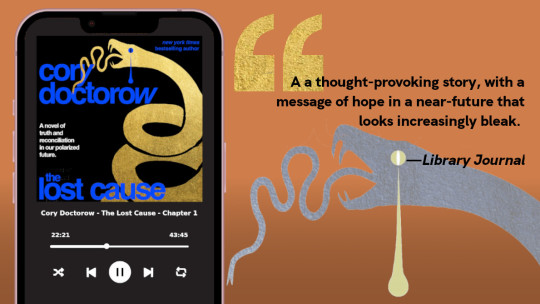
My next novel is The Lost Cause, a hopeful novel of the climate emergency. Amazon won't sell the audiobook, so I made my own and I'm pre-selling it on Kickstarter!

Image:
JD Lasica (modified)
https://commons.wikimedia.org/wiki/File:Elon_Musk_%283018710552%29.jpg
CC BY 2.0
https://creativecommons.org/licenses/by/2.0/deed.en
#pluralistic#twitter#posse#elon musk#x#social media#graceful failure modes#end-to-end principle#administratable remedies#good regulation#ads#privacy#benevolent dictatorships#freedom of reach#journalism#enshittification#switching costs
796 notes
·
View notes
Text
Twitter is having issues....
A lot of people are not able to see their notifications or any new tweets in their feeds.
Elon Musk limiting what people can see.
Question for Elon Musk is this available tweets to read? And who decides what we get to see?
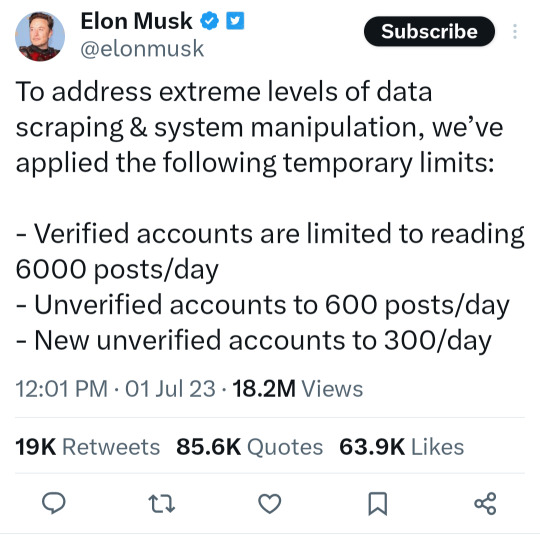
View On WordPress
2 notes
·
View notes
Text
Gideon Nav terrible fashion sense is so important to me babygirl has never been free to dress herself in her LIFE and i firmly believe that if she did have that freedom she would wear just. the most dogshit outfits. socks with slides. neon colors. shirts that say TITS with an arrow pointing down. outfits so bad every woman she meets is begging to take her on a department store makeover episode. outfits so bad you wonder if she got dressed in the dark upside down picking her clothing items by chaos potential. outfits so bad they wrap around to being sick as hell before winding back and punching you straight in the face
#gideon nav#the locked tomb#thinking about how her whole life she's just been. stuck in roles dictated to her. and trying to break free so bad#but babygirl is in QUICKSAND the more she reaches for freedom the more violently it is ripped away from her.#anyway. gideon goofy oitfit truthers rise up#like if she had the freedom to dress herself eventually i think she would grow to have a really nice sense of style#but she needs that freedom first. to be goofy.#to ME#trb.txt#tlt thoughts
4K notes
·
View notes
Text

Sharing is Caring!
[First] Prev <–-> Next
#poorly drawn mdzs#mdzs#wei wuxian#lan wangji#jiang cheng#While listening to the Lotus Seed extra I was like 'aw this art is so cute.'#Post The Fanfic Fiasco (re: last comic's tags) I am haunted by the green orbs. WWX has a bag of edible green orbs and I am in hell.#First draft of this comic's script has JC saying 'dude you wouldn't even share with me!' and I love his little sibling indignation.#Middle child power is knowing that you don't have to share with your siblings. The little wet eyes and weak hand slaps do NOTHING.#JC probably already ate all of his lotus seeds. That's on you dude!#Part of me wants to get deeper with the metaphor of the lotus seeds here. It is a gesture of a certain kind of affection.#JYL gives something to WWX she does not quite share with JC. And WWX in turn gives something to LWJ he does not share with JC.#Really puts JC's line 'You're always eating...eating eating' into a very different light.#There are other kinds of starving besides hunger. There are other ways to be a glutton than just food and drink.#WWX's character pre-burial mounds is heavily focused on 'Indulgence'. Be it wine or flirting or hunting or eating-#-or receiving admiration; He is always indulging in ways we never see JC do.#I think the intentional contrast was with the Lan's 'Live simple and without indulgence' lifestyle. LWJ is the abstainer to wwx's gluttony.#But it does expand to JC as well! Both are locked into the role model position to have friction against WWX's apparent freedom.#I think LWJ and JC (at this point) see WWX as something they both want (in different capacities) and someone they want to be.#Yet despite the history between them it is not JC who WWX reaches out to. It's LWJ.#The boy already has an inferiority complex! Stop making it accidently worse!
717 notes
·
View notes
Text
Reject gender.
Become God.
#i don't want your silly human roleplay i want to be the cosmic horror#become something more than a human#reach the true form of your identity#lmao i sound like im in a cult#it's about freedom of mind yaaalll#gender#is a lie#shitpost#i have thoughts in my head#:p
184 notes
·
View notes
Text


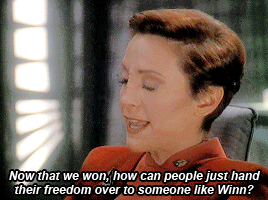
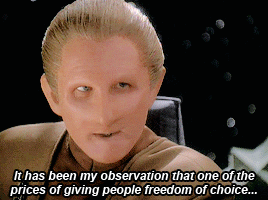


#tv: star trek: deep space ine#ds9edit#trekedit#kira nerys#kira x odo#kiraodo#kira nerys is so important guys#okay here we go#this is true#it is important that when you give people the freedom to choose#you also give them the freedom to choose wrong#however#this episode also points out that it's important not to allow that to rob you of your will to act when it's necessary#winn is a very manipulative corrupt and immoral person determined to collect and viciously defend any power she gets her hands on#kira knows this#her lover was sacrificed for winn's ambition and for the fact that her reach often exceeds her grasp#kira shakkar and most of bajor spends this episode fighting against her growing fascist attempts to impose her personal sense of order#so while yes it is important and necessary that people be allowed to make the wrong choice#it is also necessary not to allow disappointment over that fact to make you complacent#when you can you still need to stand up for what's right#and fighting fascists is always right#things i made
137 notes
·
View notes
Text
So, this parallel, right.
That parallel and the 4x11 shadowpeach fight as a whole:
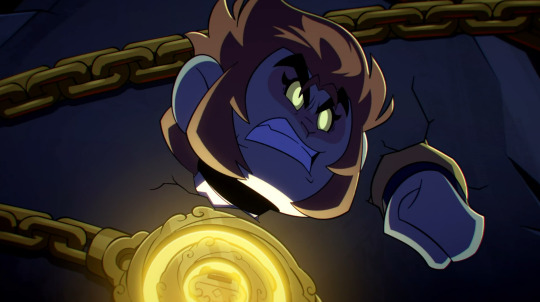
Macaque: "No that's YOU! You're the one always running off! Looking for more power, more sources of immortality—you're the one who wouldn't quit while were were ahead! Not the great sage, he's got to drag EVERYONE else into his mess!"
Sun Wukong: "You're not in this mess, you're still free! Everything I did was for us!"
Macaque: "You did it for yourself! You've become like this, obsessive demon! I told you going against the Jade Emperor was a bad idea, but no, Wukong doesn't listen to anyone! He just does whatever he wants! You put yourself here, not me."
(4x11 A Lifetime of Mistakes)
-
A large part of Wukong's motivation to keep getting more power was the freedom of it—the more power you have the easier it is to do whatever you want. It's easier to ignore everyone else and focus solely on yourself. It's also easier to ensure yourself and your loved one's are protected and have the ability to do what they want.
So, a punishment where the great Monkey King is imprisoned and trapped for hundreds of years? It's effective and tragic and fitting. Wukong wanted to have the freedom to protect the people he cared about, and in trying to reach for the power to do that, he completely had his freedom removed. He went from the mountain, to then the circlet, and then all of a sudden he had morals and was bound to those.
And then I think about his end of s3 choice to go face the Lady Bone Demon alone. Once again Wukong was trying to protect his loved ones (not to mention the whole reason he went after the Samadhi fire to begin with was to have the power, the freedom to stop LBD (which in itself is another case of SWK believing he needed to be stronger for such freedom)), but he also wanted to make sure MK and himself both had agency. He didn't want MK to have to fight LBD, and he didn't want LBD to end the world.
This is exactly the sentiment he tells Macaque in the 4x11 flashback:
Sun Wukong: "It's so we don't have to worry about anything or anyone ever again! Just living a lazy life, sitting in the sun, eatin' fruit, and doing whatever we want!"
But where does it all lead him?
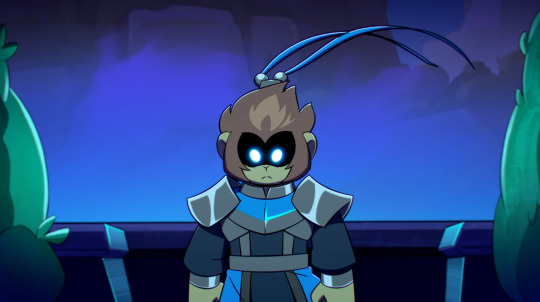
To possession, imprisonment. Once again Wukong no longer had the freedom to do what he wanted (which is to protect the people he cares about). Once again in his attempts to help his loved one's, he only hurt them.
This can be applied to his relationship with Macaque, to MK in s2, hell, even Wukong trying to get the map in the first place left him powerless, which then led to him and the gang being imprisoned in 3x02. It's a familiar pattern, one we see with antagonist and protagonist alike.
MK in s2 trained to become more powerful, which in the end only strengthened LBD and forced him and his friends on the run. Mei in 3x12 protects MK by letting herself get captured and placed into LBD's crystal. Mei in 4x05 goes to protect MK, breaking her sword and leaving her vulnerable to being captured by Kui Mulang ("How am I supposed to protect everyone without my sword?"). DBK reached for more power and then became possessed by LBD, hurting his wife and son. Azure reached for the Jade Emperor's power and bound himself to that role, jeopardizing Peng and Yellowtusk in the process.
It's a cycle of reaching for power, endangering others, and then being imprisoned.
So anyways, here's why MK is going to lose control (his agency) next season and hurt his friends with his own- *get's shot*
#*cough cough* shut up this isn't similar to Callum and Viren from tdp at all.#Ignore everything I said about the reach for power to have freedom and that leading to consequences. Shhhhhhh#anyways GOSH HMMM THE CHARACTER ARCS YAY#I LOVE WHEN THEMATICALLY RELEVANT THINGS HAPPEN TO CHARACTERS#Like. It's not just ''Wukong got possessed'' it's how Wukong getting possessed plays into his character and the show as a whole#Which is why lmk is so good#A league above the rest#Ignore that this is also the exact same thing that happens to Callum with possession. Shhhhh.#But y'all get my point#So anyways in reaching for power and having the agency to protect those you care about#And continuing Mei and SWK parallels#I think it would be neat if Mei accepted the Samadhi fire again to protect her friends for whatever reason#It'd also be neat if she did it specifically to fight MK/get him back#Like teehee that would be so cool#Am I saying MK next season might very well parallel possessed Wukong? yes that's exactly what I'm saying.#lmk SWK#lmk#lego monkie kid#lmk analysis#you know what executive decision tag#hero mei warrior mk
236 notes
·
View notes
Text
Oh, your love is sunlight

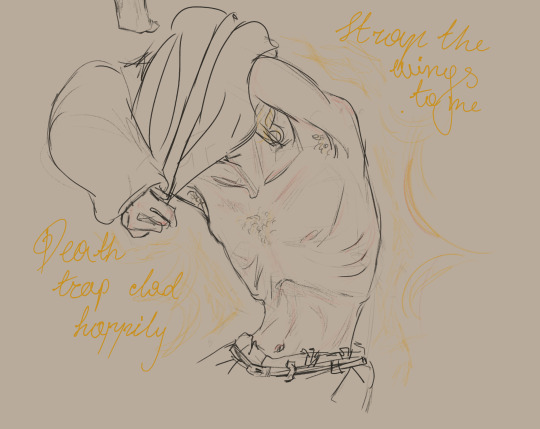


Happy (late) Valentine's Day (version without text ↓ +description in tags)

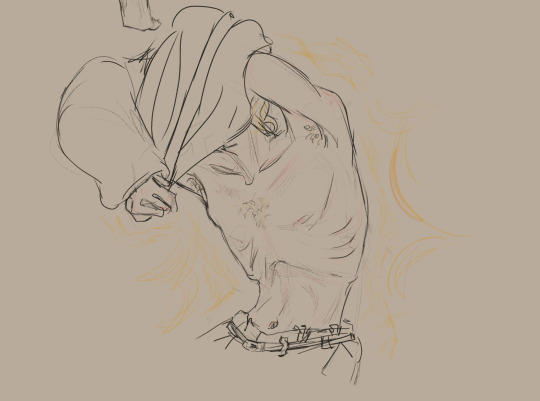

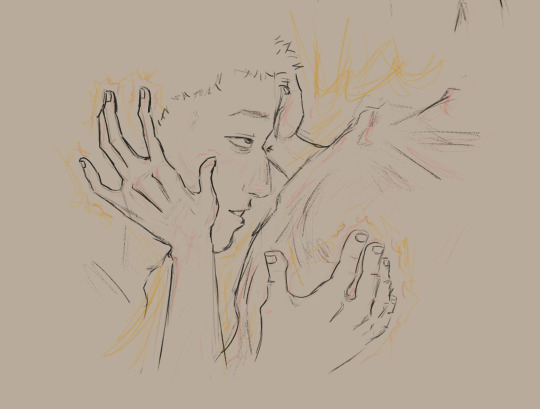
#east blue asylum wing au#zosan#zoro x sanji#zs#first off if its bad quality - it's a huge canvas and it's more pixelated if i try to export the picture than if I screenshot so... :/#I sometimes like assigning songs to different dynamics and or characters I play around with and I've been recently listening to#a lot of Hozier again and I'd like to think that Sunlight is how Zoro sees Sanji - he is Icarus flying to the sun and he is willing to get#burned if only to reach the sunlight - it's a deathtrap... because of course it is... all attachments are but Sanji's love is the death tra#that he welcomes like a moth to a flame because even Icarus felt the bliss and freedom before his wax melted#I haven't depicted it here but Sanji's Hozier song for Zoro would probably be NFWMB because in his eyes Zoro is this untouchable force#that would watch the world go up in flames and when the time Sanji wouldn't mind being a tree just to fuel his fire (im well aware how#cheesy that sounds just bare with me... or better yet listen to the song its really good trust me ok?)#the world starts and ends with him and where they lay#and their shared Hozier song is Francesca because if anything in this au zosan are two lovers stuck in Dante's inferno and sprinting back i#only for the chance to get back to their lover and if that meant going back into hell to look for each other then so be it#there's a part of the song that goes ��My life was a storm / Since I was born / How could I fear any hurricane?” which is pretty fitting imo#op#fan art#my art
90 notes
·
View notes
Text
Okay, how did I just now realize that I never posted this amazing commission from @quicksillver?
I asked for a scene from Freedom's Reach, not realizing in my non-artist head that the scene I chose would be a technical *nightmare* what with mirrors being little bastards and all, but Misha came through like an absolute CHAMP. Definitely stop by their blog and give them all the love!


“Penny for your thoughts?” Bucky says. Clint looks up, startled, to find Bucky standing in front of him, collar up and a tie looped around his neck.
Clint clears his throat a little, sure that he must be blushing. There’s a standing mirror in the corner and Clint guides Bucky over to it, crowding in behind him to knot the tie. “I’ll tell you about them later,” he growls, deep and low into Bucky’s ear, just to make him shiver. “Or else we’ll never get there in time.”
Clint takes note of how Bucky’s eyes in the mirror go dark and hot, and he presses a little closer than necessary, letting Bucky feel every inch of him along his back. He reaches out a hand and snags Bucky’s jacket where it’s waiting on the back of a chair, watching in the mirror as he helps Bucky into it and smooths his palms down the front, the gold ring on his left hand gleaming in the lamplight. The left arm of Bucky’s jacket is pinned up neatly, the dark blue wool skimming Bucky’s lean frame and making his eyes glow an icy blue.
“You look beautiful,” Clint can’t help but murmur.
Bucky turns, hand sliding inside Clint’s jacket to cradle his ribs through the thin linen of his shirt, his own ring cool and hard in contrast to the warm press of his fingers. “That’s the pot calling the kettle black,” he says, cutting off Clint’s retort with a hungry kiss.
By the time they tear themselves apart they are running a bit late, and have to take a few more moments to straighten up their clothes anew. Clint’s skin is still buzzing as he and Bucky descend the grand staircase to the main lobby, hand-in-hand. Bucky gives Clint’s fingers a squeeze and Clint squeezes back, their rings clinking together as they head toward the dining room.
#the winter soldier#bucky barnes#clint barton#hawkeye#marvel#mcu#winterhawk#my fic#freedom's reach#historical au#mail order bride au#arranged marriage au#comic!clint barton#fraction/aja comic!clint barton#deaf!clint barton#whob2021#winterhawk olympic bang
177 notes
·
View notes
Text
Anti-immigration rioting currently going on in Dublin, I just know people like the Irish Freedom Party (our fairly recent and small right wing party) is going to take advantage of people's anger over today's stabbing and Ashling Murphy's murder to drum up votes, so I took a look through their other policies
They are in favour of 'Itrexit' - Ireland leaving the EU and dropping the euro currency
They are vehemently anti-abortion (their constitution says 'pro-natal' but their leader has been quoted saying 'abortion is a stain on this country'
They are seeking changes to the 1989 hate speech legislation (which isn't even very effective for prosecuting hate crimes) in order to protect free speech - citing that hate speech legislation has been used in other countries against Christian pastors (I smell homophobia and transphobia)
They are pro reunification (and everyone is in theory, of course it would be nice, but right now it would cost the relative peace that Northern Ireland has had in my lifetime)
Reminding people to look beyond one issue before giving a party like this a vote
#irish politics#irish freedom party#ireland#hoping to reach Irish tumblr when everyone comes out of the woodwork for the toy show tomorrow
40 notes
·
View notes
Text
Better failure for social media
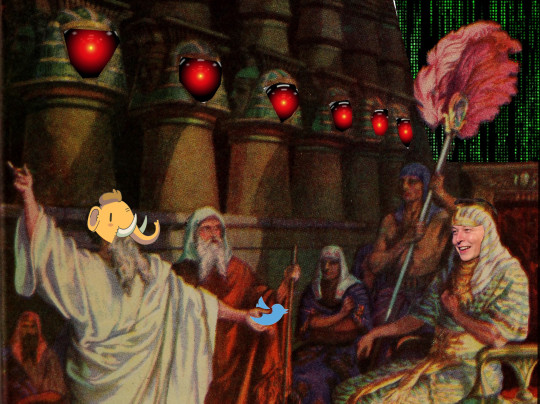
Content moderation is fundamentally about making social media work better, but there are two other considerations that determine how social media fails: end-to-end (E2E), and freedom of exit. These are much neglected, and that’s a pity, because how a system fails is every bit as important as how it works.
Of course, commercial social media sites don’t want to be good, they want to be profitable. The unique dynamics of social media allow the companies to uncouple quality from profit, and more’s the pity.
Social media grows thanks to network effects — you join Twitter to hang out with the people who are there, and then other people join to hang out with you. The more users Twitter accumulates, the more users it can accumulate. But social media sites stay big thanks to high switching costs: the more you have to give up to leave a social media site, the harder it is to go:
https://www.eff.org/deeplinks/2021/08/facebooks-secret-war-switching-costs
Nature bequeaths some in-built switching costs on social media, primarily the coordination problem of reaching consensus on where you and the people in your community should go next. The more friends you share a social media platform with, the higher these costs are. If you’ve ever tried to get ten friends to agree on where to go for dinner, you know how this works. Now imagine trying to get all your friends to agree on where to go for dinner, for the rest of their lives!
But these costs aren’t insurmountable. Network effects, after all, are a double-edged sword. Some users are above-average draws for others, and if a critical mass of these important nodes in the network map depart for a new service — like, say, Mastodon — that service becomes the presumptive successor to the existing giants.
When that happens — when Mastodon becomes “the place we’ll all go when Twitter finally becomes unbearable” — the downsides of network effects kick in and the double-edged sword begins to carve away at a service’s user-base. It’s one thing to argue about which restaurant we should go to tonight, it’s another to ask whether we should join our friends at the new restaurant where they’re already eating.
Social media sites who want to keep their users’ business walk a fine line: they can simply treat those users well, showing them the things they ask to see, not spying on them, paying to police their service to reduce harassment, etc. But these are costly choices: if you show users the things they ask to see, you can’t charge businesses to show them things they don’t want to see. If you don’t spy on users, you can’t sell targeting services to people who want to force them to look at things they’re uninterested in. Every moderator you pay to reduce harassment draws a salary at the expense of your shareholders, and every catastrophe that moderator prevents is a catastrophe you can’t turn into monetizable attention as gawking users flock to it.
So social media sites are always trying to optimize their mistreatment of users, mistreating them (and thus profiting from them) right up to the point where they are ready to switch, but without actually pushing them over the edge.
One way to keep dissatisfied users from leaving is by extracting a penalty from them for their disloyalty. You can lock in their data, their social relationships, or, if they’re “creators” (and disproportionately likely to be key network nodes whose defection to a rival triggers mass departures from their fans), you can take their audiences hostage.
The dominant social media firms all practice a low-grade, tacit form of hostage-taking. Facebook downranks content that links to other sites on the internet. Instagram prohibits links in posts, limiting creators to “Links in bio.” Tiktok doesn’t even allow links. All of this serves as a brake on high-follower users who seek to migrate their audiences to better platforms.
But these strategies are unstable. When a platform becomes worse for users (say, because it mandates nonconsensual surveillance and ramps up advertising), they may actively seek out other places on which to follow each other, and the creators they enjoy. When a rival platform emerges as the presumptive successor to an incumbent, users no longer face the friction of knowing which rival they should resettle to.
When platforms’ enshittification strategies overshoot this way, users flee in droves, and then it’s time for the desperate platform managers to abandon the pretense of providing a public square. Yesterday, Elon Musk’s Twitter rolled out a policy prohibiting users from posting links to rival platforms:
https://web.archive.org/web/20221218173806/https://help.twitter.com/en/rules-and-policies/social-platforms-policy
This policy was explicitly aimed at preventing users from telling each other where they could be found after they leave Twitter:
https://web.archive.org/web/20221219015355/https://twitter.com/TwitterSupport/status/1604531261791522817
This, in turn, was a response to many users posting regular messages explaining why they were leaving Twitter and how they could be found on other platforms. In particular, Twitter management was concerned with departures by high-follower users like Taylor Lorenz, who was retroactively punished for violating the policy, though it didn’t exist when she violated it:
https://deadline.com/2022/12/washington-post-journalist-taylor-lorenz-suspended-twitter-1235202034/
As Elon Musk wrote last spring: “The acid test for two competing socioeconomic systems is which side needs to build a wall to keep people from escaping? That’s the bad one!”
https://twitter.com/elonmusk/status/1533616384747442176
This isn’t particularly insightful. It’s obvious that any system that requires high walls and punishments to stay in business isn’t serving its users, whose presence is attributable to coercion, not fulfillment. Of course, the people who operate these systems have all manner of rationalizations for them.
The Berlin Wall, we were told, wasn’t there to keep East Germans in — rather, it was there to keep the teeming hordes clamoring to live in the workers’ paradise out. In the same way, platforms will claim that they’re not blocking outlinks or sideloading because they want to prevent users from defecting to a competitor, but rather, to protect those users from external threats.
This rationalization quickly wears thin, and then new ones step in. For example, you might claim that telling your friends that you’re leaving and asking them to meet you elsewhere is like “giv[ing] a talk for a corporation [and] promot[ing] other corporations”:
https://mobile.twitter.com/mayemusk/status/1604550452447690752
Or you might claim that it’s like “running Wendy’s ads [on] McDonalds property,” rather than turning to your friends and saying, “The food at McDonalds sucks, let’s go eat at Wendy’s instead”:
https://twitter.com/doctorow/status/1604559316237037568
The truth is that any service that won’t let you leave isn’t in the business of serving you, it’s in the business of harming you. The only reason to build a wall around your service — to impose any switching costs on users- is so that you can fuck them over without risking their departure.
The platforms want to be Anatevka, and we the villagers of Fiddler On the Roof, stuck plodding the muddy, Cossack-haunted roads by the threat of losing all our friends if we try to leave:
https://doctorow.medium.com/how-to-leave-dying-social-media-platforms-9fc550fe5abf
That’s where freedom of exit comes in. The public should have the right to leave, and companies should not be permitted to make that departure burdensome. Any burdens we permit companies to impose is an invitation to abuse of their users.
This is why governments are handing down new interoperability mandates: the EU’s Digital Markets Act forces the largest companies to offer APIs so that smaller rivals can plug into them and let users walkaway from Big Tech into new kinds of platforms — small businesses, co-ops, nonprofits, hobby sites — that treat them better. These small players are overwhelmingly part of the fediverse: the federated social media sites that allow users to connect to one another irrespective of which server or service they use.
The creators of these platforms have pledged themselves to freedom of exit. Mastodon ships with a “Move Followers” and “Move Following” feature that lets you quit one server and set up shop on another, without losing any of the accounts you follow or the accounts that follow you:
https://codingitwrong.com/2022/10/10/migrating-a-mastodon-account.html
This feature is as yet obscure, because the exodus to Mastodon is still young. Users who flocked to servers without knowing much about their managers have, by and large, not yet run into problems with the site operators. The early trickle of horror stories about petty authoritarianism from Mastodon sysops conspicuously fail to mention that if the management of a particular instance turns tyrant, you can click two links, export your whole social graph, sign up for a rival, click two more links and be back at it.
This feature will become more prominent, because there is nothing about running a Mastodon server that means that you are good at running a Mastodon server. Elon Musk isn’t an evil genius — he’s an ordinary mediocrity who lucked into a lot of power and very little accountability. Some Mastodon operators will have Musk-like tendencies that they will unleash on their users, and the difference will be that those users can click two links and move elsewhere. Bye-eee!
Freedom of exit isn’t just a matter of the human right of movement, it’s also a labor issue. Online creators constitute a serious draw for social media services. All things being equal, these services would rather coerce creators’ participation — by holding their audiences hostage — than persuade creators to remain by offering them an honest chance to ply their trade.
Platforms have a variety of strategies for chaining creators to their services: in addition to making it harder for creators to coordinate with their audiences in a mass departure, platforms can use DRM, as Audible does, to prevent creators’ customers from moving the media they purchase to a rival’s app or player.
Then there’s “freedom of reach”: platforms routinely and deceptively conflate recommending a creator’s work with showing that creator’s work to the people who explicitly asked to see it.
https://pluralistic.net/2022/12/10/e2e/#the-censors-pen
When you follow or subscribe to a feed, that is not a “signal” to be mixed into the recommendation system. It’s an order: “Show me this.” Not “Show me things like this.”
Show.
Me.
This.
But there’s no money in showing people the things they tell you they want to see. If Amazon showed shoppers the products they searched for, they couldn’t earn $31b/year on an “ad business” that fills the first six screens of results with rival products who’ve paid to be displayed over the product you’re seeking:
https://pluralistic.net/2022/11/28/enshittification/#relentless-payola
If Spotify played you the albums you searched for, it couldn’t redirect you to playlists artists have to shell out payola to be included on:
https://pluralistic.net/2022/09/12/streaming-doesnt-pay/#stunt-publishing
And if you only see what you ask for, then product managers whose KPI is whether they entice you to “discover” something else won’t get a bonus every time you fatfinger a part of your screen that navigates you away from the thing you specifically requested:
https://doctorow.medium.com/the-fatfinger-economy-7c7b3b54925c
Musk, meanwhile, has announced that you won’t see messages from the people you follow unless they pay for Twitter Blue:
https://www.wired.com/story/what-is-twitter-blue/
And also that you will be nonconsensually opted into seeing more “recommended” content from people you don’t follow (but who can be extorted out of payola for the privilege):
https://www.socialmediatoday.com/news/Twitter-Expands-Content-Recommendations/637697/
Musk sees Twitter as a publisher, not a social media site:
https://twitter.com/elonmusk/status/1604588904828600320
Which is why he’s so indifferent to the collateral damage from this payola/hostage scam. Yes, Twitter is a place where famous and semi-famous people talk to their audiences, but it is primarily a place where those audiences talk to each other — that is, a public square.
This is the Facebook death-spiral: charging to people to follow to reach you, and burying the things they say in a torrent of payola-funded spam. It’s the vision of someone who thinks of other people as things to use — to pump up your share price or market your goods to — not worthy of consideration.
As Terry Pratchett’s Granny Weatherwax put it: “Sin is when you treat people like things. Including yourself. That’s what sin is.”
Mastodon isn’t perfect, but its flaws are neither fatal nor permanent. The idea that centralized media is “easier” surely reflects the hundreds of billions of dollars that have been pumped into refining social media Roach Motels (“users check in, but they don’t check out”).
Until a comparable sum has been spent refining decentralized, federated services, any claims about the impossibility of making the fediverse work for mass audiences should be treated as unfalsifiable, motivated reasoning.
Meanwhile, Mastodon has gotten two things right that no other social media giant has even seriously attempted:
I. If you follow someone on Mastodon, you’ll see everything they post; and
II. If you leave a Mastodon server, you can take both your followers and the people you follow with you.
The most common criticism of Mastodon is that you must rely on individual moderators who may be underresourced, incompetent on malicious. This is indeed a serious problem, but it isn’t the same serious problem that Twitter has. When Twitter is incompetent, malicious, or underresourced, your departure comes at a dear price.
On Mastodon, your choice is: tolerate bad moderation, or click two links and move somewhere else.
On Twitter, your choice is: tolerate moderation, or lose contact with all the people you care about and all the people who care about you.
The interoperability mandates in the Digital Markets Act (and in the US ACCESS Act, which seems unlikely to get a vote in this session of Congress) only force the largest platforms to open up, but Mastodon shows us the utility of interop for smaller services, too.
There are lots of domains in which “dominance” shouldn’t be the sole criteria for whether you are expected to treat your customers fairly.
A doctor with a small practice who leaks all ten patients’ data harms those patients as surely as a hospital system with a million patients would have. A small-time wedding photographer who refuses to turn over your pictures unless you pay a surprise bill is every bit as harmful to you as a giant chain that has the same practice.
As we move into the realm of smalltime, community-oriented social media servers, we should be looking to avoid the pitfalls of the social media bubble that’s bursting around us. No matter what the size of the service, let’s ensure that it lets us leave, and respects the end-to-end principle, that any two people who want to talk to each other should be allowed to do so, without interference from the people who operate their communications infrastructure.
Image:
Cryteria (modified)
https://commons.wikimedia.org/wiki/File:HAL9000.svg
CC BY 3.0
https://creativecommons.org/licenses/by/3.0/deed.en
Heisenberg Media (modified)
https://commons.wikimedia.org/wiki/File:Elon_Musk_-_The_Summit_2013.jpg
CC BY 2.0
https://creativecommons.org/licenses/by/2.0/deed.en
[Image ID: Moses confronting the Pharaoh, demanding that he release the Hebrews. Pharaoh’s face has been replaced with Elon Musk’s. Moses holds a Twitter logo in his outstretched hand. The faces embossed in the columns of Pharaoh’s audience hall have been replaced with the menacing red eye of HAL9000 from 2001: A Space Odyssey. The wall over Pharaoh’s head has been replaced with a Matrix ‘code waterfall’ effect. Moses’s head has been replaced with that of the Mastodon mascot.]
#pluralistic#e2e#end-to-end#freedom of reach#mastodon#interoperability#social media#twitter#economy#creator economy#artists rights#content moderation#como#right of exodus#let my tweeters go#exodus#right of exit#technological self-determination
3K notes
·
View notes
Text
throwing up blood thinking about how in the 0th round all yjh wants to do is figure out how/why he exists, having seemingly just appeared one day as a fully fuctional adult. it’s a big part of why he chooses to regress, he’s willing to suffer for thousands of lifetimes not only to meet kdj but to learn about himself. and 1864 lives later, after this beginning is nothing more than a forgotten memory, after he’s torn apart the world for the sake of one man, he’s found out how he exists, but not why. In reading kdj’s story, in realizing that he would likely never go back to earth, he decides why he exists: to make just a single person happy. Only now that he has the answers he’s sought for so long, he’s left with the question that he cannot answer for himself: how does he continue to live on. In a world without a reader, without regressions, how is he meant to live on? He’s never known anything else, doesn’t know what it means to live as a person not trapped in the past. But despite that, despite everything, he still puts his all into delivering kdj’s story to everyone, and in making sure that he returns home.
#orv#orv spoilers#omniscient reader#omniscient reader spoilers#crying screaming throwing up#yoo joonghyuk#im literally gonna throw myself into the nearest river yjh's last pov chapters make me so fucking EMO#although i think it's only fitting that we never see what his ending is#not only for the whole thematics of it#characters existing beyond the readers comprehension#but also cause i personally see it as freedom#yjh's ending is the freedom to live as his own person#and whatever that brings for him#bc while yjh has always had agency he has never lived outside the star stream system#him reaching his ending after coming to the conclusions on his own is perfect
435 notes
·
View notes
Text
Being on Tumblr is super depressive these days.
My favourite character got twisted and destroyed by new canon, and many of my fandom mutuals celebrated it. It just feels weird, because I'm in mourning (even though I do reject that canon and am trying to keep him alive in my world), but they're not. I don't know how to interact with them anymore. So I've stopped.
Meanwhile mutuals who agreed with me on many things are suddenly spewing antisemitic rhetoric or reblogging posts praising terrorists like Hamas and bin Laden. It's giving me such a whiplash that I'm unable to process it still.
I want to close my eyes and ignore all of this, but I can't. I unfollow and block, but the sense of shock and betrayal remains...

#as someone who has seen terror attacks on her country I just cannot accept Hamas as simply a resistance or freedom fighter group#Hamas leaders are billionaires but they don't uplift Palestinians. they just use them to get aid and support which never reaches them#freedom struggle should never include rapes and brutality. but Hamas does it and gets away with it#personal post#seeing mutuals transform like this is hella depressing#maybe I need to go offline for a while
28 notes
·
View notes
Text
One thing I think is interesting/useful to note about the Rose Red book is that it is a book that was published in the OUATIS galaxy a little under ten years after the war, and that it has an in-story author— and, crucially, that author is not necessarily an entirely reliable narrator.
More rambling about this under the cut
The author, Althea, is a normcivilian with an unusual amount of sympathy for the now-decommissioned Rose Reds. This is not a popular position, and between:
A) her rhetorical goal of changing the minds of people actively against the Rose Reds being allowed to survive
B) the constraints of mainstream publishers, who are under social/political pressure to not threaten the new government, requiring her to be both neutral and not too challenging,
C) her own corresponding bias in believing that neutrality is both possible and desirable,
and D) her limited viewpoint as a normcivilian (not a Rose Red) from a privileged background,
There are quite a lot of places where events, people, and viewpoints are presented in ways that are somewhat misleading. Althea has a degree in journalism, but she does not live in an entirely free society, and both external forces and her own biases do color the narrative she presents throughout the book.
In short, she’s the equivalent of a left-leaning ally to a marginalized group who’s a bit more centrist than one might hope and is presenting herself as even more centrist in order to be published at all through mainstream channels and taken seriously by people who are biased against her cause.
#my fic#one thousand and three#rose red book#I figure she’s willing to bargain the constraints of traditional publishing for the reach they offer#in service of her greater goal of humanizing the rose reds to other norms#this is a compromise she can make. I think many rose reds would feel differently#including several she interviews#it would also fundamentally be a different book if it were written for rose reds#Althea’s biggest flaw in approaching this is attempting to be palatable to an audience who is hostile to the people she writes about#and this creates some. problematic dynamics in how she handles some of the issues she’s discussing as an outsider#I have. a lot of thoughts about the politics of the book#and also how they intersect with broader galactic politics#(especially when it comes to freedom of ideas and censorship)#anyway thanks to anyone who’s read all this meta rambling about rhetoric and narrative in this project#hope you enjoy the book itself lmao
20 notes
·
View notes
Text

#yttd maple#ask 2 tag#ive been having a very hard time with my art lately (then again art has always been tough)#so this was drawn as a stress relief + freedom to do what i wanted to draw with no rules or limitaitons or references#and i decided maple bc well depsite her being on myblogf i havent drawn her mcuh havi#sorry my wife#it isnt as a vent or anything just a concept#but at least i got some art finished#im glad for that#its just been everyutiome i open up firelaappca i do a stroke nad some things here and there#but then it just ends up with me despising my style my limited skills and the fact i cant reach what i want#which obv isnt healthy i love art#but ah. ive ranted abt it enough#i swearill terry to develop a healthier midnset soon <3#for now take !#gogogo
71 notes
·
View notes
Text
WAIT WAIT WAIT CONSIDER THIS: TOM AND BARBARA AS ORPHEUS AND EURYDICE, ALAN AND ALICE AS A DOOMED RETELLING
#alan wake#like this is fully what they already are - not in a 'someone make this content' way. they just Are#alan wake 2#alice wake#tom zane#barbara jagger#barbara dies in a tragedy and tom is overcome with grief and through art and song (film/poetry) moves heaven and earth to bring#her back from the darkness - only to discover the dark place did not grant him his love again merely a shade of her#and so in that same roiling grief he destroyed himself - cast himself back into hell#the dark place took Alice so Alan followed her into hell - but despite Thomas's guidance he could not save both himself and Alice#and so he did the impossible and trapped himself in exchange for her freedom#Alan was taken by the dark place and so Alice followed him into hell once more#and she - knowing he could not afford to look back if he was ever to escape - tricked him into thinking she was already lost#sacrificing herself to lead him back to the light#and now the cycle is broken. alan cannot follow her into hell again - at least not in the same way as before#but in breaking the cycle he has declared himself the master of two worlds - is this hubris? has he doomed himself again with those words?#or does he hold the reins now? will he be able to reach into the underworld and free her? have they trancended myth itsel#*itself?#anyway. I'm a genius (jk)
19 notes
·
View notes